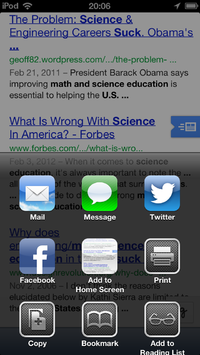share
This article is a stub. You can help the IndieWeb wiki by expanding it.
share is a watered down verb that's used on the "social web" (and other platforms like Google's Android) to mean pretty much any action. "Share" buttons no longer actually mean "share" (perhaps originally they were a synonym for post, repost, or send). "Share" buttons have become nothing more than a
- ( Do Something ) button
or if you have something selected or some other present content context, a
- ( Do Something With This ) button
devoid of any actual meaning. In this regard, "share" is merely a social web bulshytt term.
See longer explanation:
Examples
Examples of specific sites (mis)using "share" and thus diluting its meaning.
Inappropriate (dilution)
The ShareThis site and button may have been the beginning of the dilution / meaninglessness of "share". Simply try the button on their own site, look at the options, and it covers all kinds of things far beyond the original Facebook "share" meaning:
- save - to Instapaper, Evernote, etc.
- send - email
- publishing - on various sites
Google Android
Install nearly any app on Android and it will add itself to the "Share" menu no matter what its primary action is. Whether saving, sending, publishing, every app now claims to "Share". Screenshots of particularly abusive/diluted/expanded "Share" menus on Android would be helpful.
Appropriate (as per definition to tell others)
Flickr
- Share tweet via email --http://techcrunch.com/2012/11/15/twitter-adds-share-tweet-via-email-so-you-can-loop-in-people-not-on-twitter/
Others
- Share links --http://techcrunch.com/2012/11/15/twitter-adds-share-tweet-via-email-so-you-can-loop-in-people-not-on-twitter/
UI
Icons
Because share has become meaningless, the icons to represent "share" have also diverged.
iOS
iOS6 and earlier used an "outgoing tray with arrow arcing right" icon
- In iOS Safari, the share button was in the middle of button bar at the bottom of the screen
- Tapping it would slide up a "share sheet" from the bottom of the screen, dimming the rest of the content (without moving/scrolling it).
iOS7 and later uses an "outgoing tray with arrow pointing up" icon
- (icon needed)
Emoji
The outbox emoji looks roughly like a skeuomorphic version of the modern iOS share icon:
📤
There’s also a more symbolic up-arrow from a base emoji:
↥
Criticism
- Need citations. "Share is a watered down verb" feels like personal opinion, because to me it's not. --Sandeep Shetty
- Install nearly any app on Android and it will add itself to the "Share" menu no matter what its primary action is. Whether saving, sending, publishing, every app now claims to "Share". Screenshots of particularly abusive/diluted/expanded "Share" menus on Android would be helpful.
- This is not objective proof that "share is a watered down verb" for a majority of people (especially since I'm a long time Android user) --Sandeep Shetty
- Install nearly any app on Android and it will add itself to the "Share" menu no matter what its primary action is. Whether saving, sending, publishing, every app now claims to "Share". Screenshots of particularly abusive/diluted/expanded "Share" menus on Android would be helpful.
- The examples cite specific cases where the share verb is misused. To me that doesn't mean the verb share has lost it's meaning for a majority of people. To claim that it is watered down, requires citation that also claim the same. --Sandeep Shetty
- This is not Wikipedia. This page doesn't need to cite a precise quote for a claim, rather, this page contains original research (which Wikipedia disallows) and examples to prove the point.
- I agree. But does that mean if I show enough/more examples where it is used correctly it is not watered down? To make the claim, requires objective data about how a majority of people perceive the verb share. --Sandeep Shetty
- There's no need for "majority of people" perception to prove anything - examples of sites adopting a convention (dilution) is sufficient. Perceptual studies would be interesting if you can find any. Anecdotal/hearsay is less useful. Examples of sites/interfaces that use a specific "share" definition (in contrast to the examples so far which dilute the meaning of "share") would also be useful. tl:dr; provide real world example site UIs (whether specific or dilutionary) of "share".
- Will do. --Sandeep Shetty
- There's no need for "majority of people" perception to prove anything - examples of sites adopting a convention (dilution) is sufficient. Perceptual studies would be interesting if you can find any. Anecdotal/hearsay is less useful. Examples of sites/interfaces that use a specific "share" definition (in contrast to the examples so far which dilute the meaning of "share") would also be useful. tl:dr; provide real world example site UIs (whether specific or dilutionary) of "share".
- I agree. But does that mean if I show enough/more examples where it is used correctly it is not watered down? To make the claim, requires objective data about how a majority of people perceive the verb share. --Sandeep Shetty
- This is not Wikipedia. This page doesn't need to cite a precise quote for a claim, rather, this page contains original research (which Wikipedia disallows) and examples to prove the point.
- Should this page be renamed to Share Button/Action? See #No share button --Sandeep Shetty
History
- "With the rise of the World Wide Web, it was not uncommon for webmasters, including major news service websites, to encourage readers of a post to share a link to the post with others on one's contact list. Only in the mid-2000s was the "share via e-mail" solicitation accompanied or replaced by branded "sharing" buttons from various social news or bookmarking services at the time" --[1] (emphasis mine --Sandeep Shetty
Relevant definitions
- "to tell (as thoughts, feelings, or experiences) to others —often used with with" --http://www.merriam-webster.com/dictionary/share
- "To tell to another" --https://en.wiktionary.org/wiki/share
- "To relate (a secret or experience, for example) to another or others" --http://www.thefreedictionary.com/share
- "Indicates that the actor has called out the object to readers. In most cases, the actor did not create the object being shared, but is instead drawing attention to it." --http://activitystrea.ms/specs/json/schema/activity-schema.html
Perspectives
Sandeep Shetty:
Facebook uses the word share in the interface in two contexts
- Sharing a link with your friends.
- Sharing something on your timeline (photo, status, etc) with your friends.
This is consistent with the way I plan on using it because it serves my purposes well:
- If I can't find a h-card at link target it will say "Shared a link"
- If I can find a h-card at link target it will say "Shared a [post](link) by [author](url)
I am not presenting a share button on my site. Just telling my readers that I've shared something with them. Almost everything on this page is about the share button/action.
Re synonym for post or send
- IMO, before blogging (?) when there were few publishers, sharing meant to tell others about what you found, usually via email (=send). When people started blogging, posting something on the blog itself became the act of sharing (=post).
- "Use the share verb when an actor recommends an object to others. The main difference between post and share is that in share the actor is not the owner of the object." - http://wiki.activitystrea.ms/w/page/23274424/Share See also http://wiki.activitystrea.ms/w/page/23273671/Post
Framing
I've been thinking about why the Android share features doesn't bother me and I think it's because in my mind it's interpreted like this:
share with (self, others) via/using (tool)
With that framing all of these make sense:
- (save) Share with self using Instapaper/Evernote
- (send) Share with friends using email
- (publish) Share with followers using Twitter
 Kevin Marks: I see it on Android as a quicker version of copy; switch applications; paste, except that there is a possible variation based on what is selected in source. On iOS these operations tend to be much more annoying in practice, as the share equivalent there only has a few hard-coded options.
Kevin Marks: I see it on Android as a quicker version of copy; switch applications; paste, except that there is a possible variation based on what is selected in source. On iOS these operations tend to be much more annoying in practice, as the share equivalent there only has a few hard-coded options.
See Also
- posts
- repost
- web actions
- ActivityStreams
- bulshytt
- https://github.com/WICG/web-share-target/blob/master/docs/explainer.md
- Another overloading: "ride share" services that are not just about sharing a ride with other riders, but literally sharing with just the driver, formerly known as "ride hailing" services.


